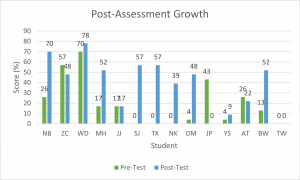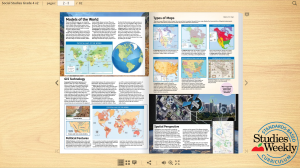What is InTASC Standard #9: Professional Learning and Ethical Practice:
InTASC #9 acknowledges that teachers are not perfect, but they can strive for improvement every day by engaging in professional learning opportunities and ethical practices. Ethical teachers constantly evaluate their instructional and classroom management practices. Through self-reflection and evaluation, teachers accept accountability for decisions that impact students and learning. This standard is significant because it addresses the idea that teachers are professionals whose impact extends far beyond the classroom–to their students, their communities, and the education profession need ethical practices.
Artifacts for InTASC Standard #9:
Unit Post-Assessment Data
To summarize what my 4th grade class learned about the Civil War throughout our two-week unit, I collected two sets of data–from the unit’s pre-assessment and post-assessment scores–and compared the data to evaluate the impact of my instruction. From the data below, I concluded that my instruction was slightly effective and developed goals for future unit planning. First, I will be more intentional about collecting and analyzing formative assessment data; second, I will work towards a consistent schedule for differentiated small groups; and lastly, I will work with students to assess their progress individually. This process of data analysis shows how I engage with InTASC Standard #9. Data analysis helped me visualize the individual assessment scores in terms of actions I can take as an ethical teacher. I accept the responsibility of my students’ academic achievement and evaluate my practice to create a high-quality learning experiences for my future students.

The chart above is a visual comparison between pre-assessment and post-assessment data for individual students.
Promising Practices in PLC
During my student teaching experience, I attended four professional learning community (PLC) meetings with the 4th grade team at Lincoln Terrace Elementary. One of these meetings challenged the 4th grade team to record one of their daily reading lessons for other teachers to evaluate and identify promising instructional practices that might be implemented across the grade level. After watching the recordings, the team discussed the shared challenge of balancing direct instruction with student-led exploration during reading lessons. These conversations reflect InTASC Standard #9 and the importance of collaboration in the professional learning community. By attending PLC meetings, I learned about the challenges that teachers face every day, and how we can come together to create solutions that support the learning of the entire 4th grade community.
Studies Weekly Curriculum Guides
On March 31st, I participated in a professional development day at Lincoln Terrace. One of the meetings I attended was an informational session on Studies Weekly, which is an educational publication used across all grade levels and subjects to support curriculum goals. In this session, I explored the features of Studies Weekly in its updated digital edition. I also learned that teachers can access free lesson plans on Studies Weekly and even customize content and assessments. By the end of the session, I not only learned to use a new instructional technology, but I also considered how this tool could transform assessment and differentiation in the classroom. This experience aligns with InTASC Standard #9 because it taught me about technology integration and 21st century skills in the classroom. I think that Studies Weekly has the potential to be a tool in my future classroom to target issues surrounding technology use in the classroom. These lessons reflect the way that I use professional development opportunities to improve my instruction.

The image above is a student’s view of the 4th grade social studies edition of Studies Weekly. This publication’s features include read-alouds and interactive images.